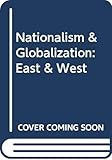Nationalism and Globalization : East and West / ed. by Leo Suryadinata.
Material type: TextPublisher: Singapore : ISEAS Publishing, [2000]Copyright date: 2000Description: 1 online resource (368 p.)Content type:
TextPublisher: Singapore : ISEAS Publishing, [2000]Copyright date: 2000Description: 1 online resource (368 p.)Content type: - 9789812300782
- 9789812305053
- 320.54 21
- JC311 .N2952 2015
- online - DeGruyter
| Item type | Current library | Call number | URL | Status | Notes | Barcode | |
|---|---|---|---|---|---|---|---|
 eBook
eBook
|
Biblioteca "Angelicum" Pont. Univ. S.Tommaso d'Aquino Nuvola online | online - DeGruyter (Browse shelf(Opens below)) | Online access | Not for loan (Accesso limitato) | Accesso per gli utenti autorizzati / Access for authorized users | (dgr)9789812305053 |
Frontmatter -- Contents -- Contributors -- Preface -- 1. “Yugoslav” Nationalism at the End of the Twentieth Century -- 2. Nation-Building and Nation-Destroying: The Challenge of Globalization in Indonesia -- 3. Globalization and Singapore’s Search for Nationhood -- 4. Globalization and Nationalism in the United States: A Historical Perspective -- 5. Globalization and the Challenges to Malay Nationalism as the Essence of Malaysian Nationalism -- 6. Nationalism and Globalization in Australia -- 7. Nation, Nationalism and Globalization in France -- 8. National Identity and Adapting to Integration: Nationalism and Globalization in Japan -- 9. Globalization, Nationalism, and the Modernization of the United Kingdom of Great Britain -- 10. Nationalities, Nationalism, and Globalization: The Case of China -- 11. Grasping the Nettle: Indian Nationalism and Globalization -- 12. Nationalism and Globalization in the Russian Federation at the Millennium -- 13. Conclusion -- Index
restricted access online access with authorization star
http://purl.org/coar/access_right/c_16ec
Nationalism and globalization are two major contradicting forces in the world today. The roles that these two forces play and the impact of globalization on countries differ. Both Western and Asian "nation-states" have faced the challenge of globalization in recent decades, and the challenge has become more intense since the 1990s. The decline of communism and socialism as ideologies, and the decreasing importance of national boundaries for capital, companies and even labour, have had profound implications for national identity. Thus, the impact of globalization on "nation-states" is not identical. How have "nation-states" coped with globalization? Has it led to stronger nationalism or national disintegration? What has happened to national identity? Is the concept of "nation" still relevant in the era of globalization? To answer these questions, twelve countries -- six from the West (France, UK, USA, Yugoslavia, Australia, and Russia) and six from Asia (Indonesia, Malaysia, Singapore, Japan, China, and India) have been selected for study. These countries represent a wide range of national experiences — from "old" states to "new" states, from mono-ethnic nations to multi-ethnic ones, and from surviving nation-states to decaying ones. Apart from the individual country studies, the last chapter summarizes and compares the findings of these country studies, throwing light on the various types of nationalism, and the gains and losses of these countries in the process of globalization
Mode of access: Internet via World Wide Web.
In English.
Description based on online resource; title from PDF title page (publisher's Web site, viewed 26. Aug 2024)


